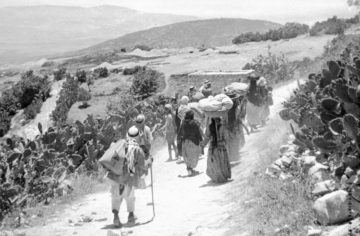Peter Beinart in The Guardian:
 Last Saturday was Nakba Day, which commemorates the 700,000 Palestinians who were expelled by Israel – or who fled in fear – during the country’s founding in 1948. The commemoration had special resonance this year, since it was Israel’s impending expulsion of six Palestinian families from the East Jerusalem neighbourhood of Sheikh Jarrah that helped trigger the violent struggle currently engulfing Israel-Palestine. For many Palestinians, that imminent expulsion was evidence that the Nakba has still not come to an end.
Last Saturday was Nakba Day, which commemorates the 700,000 Palestinians who were expelled by Israel – or who fled in fear – during the country’s founding in 1948. The commemoration had special resonance this year, since it was Israel’s impending expulsion of six Palestinian families from the East Jerusalem neighbourhood of Sheikh Jarrah that helped trigger the violent struggle currently engulfing Israel-Palestine. For many Palestinians, that imminent expulsion was evidence that the Nakba has still not come to an end.
Every year, commemorating the Nakba represents a kind of mental struggle to remember the past and sustain the hope that it can be overcome – by ensuring that Palestinian refugees and their descendants can return home. In my own community, by contrast, Jewish leaders in Israel and the diaspora demand that Palestinians forget the past and move on. In 2011, Israel’s parliament passed a law that could deny government funds to any institution that commemorates the Nakba. Israeli teachers who mention it in their classes have been reprimanded by Israel’s Ministry of Education. Last year, two Israeli writers, Adi Schwartz and Einat Wilf, published an influential book, The War of Return, which criticised the Palestinian desire for refugee return as emblematic of a “backward-facing mode” and an “inability to reconcile with the past”.
As it happens, I read The War of Return last year just before Tisha B’Av, the day on which Jews mourn the destruction of the temples in Jerusalem and the exiles which followed. On Tisha B’Av itself, I listened to medieval kinnot, or dirges, that describe those events – which occurred, respectively, 2,000 and 2,500 years ago – in the first person and the present tense.
More here.
